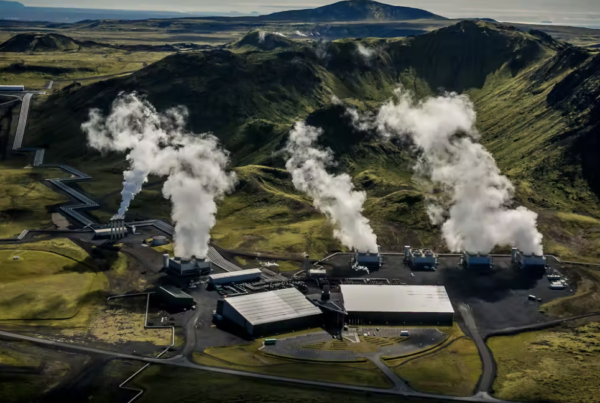1. Fashion Cleans Up Sustainability Messaging
You’re probably aware of how big the fashion industry’s footprint is on our environment. As much as 10% of all greenhouse gas emissions by most measures. For too long, the fashion industry has been cleared to ignore environmental standards by just sweeping this reality under the rug. From petroleum based fabrics to an incredible amount of waste created from the fast fashion craze to the micro-plastics pouring into our oceans, there is a lot to do.
In recent years, “sustainability” has become a buzzword in fashion and most major brands and fashion houses have jumped into dabbling in cleaning up their environmental standards. Trouble is – the actual standards of sustainability in fashion are so loose and hand-wavy that the word itself is starting to mean next to nothing at all. Greenwashing – the notion of using environmental marketing and spin without true significant change to practices and standards – is a bigger problem in fashion than almost any other industry.
We predict this will start to change in 2021. There are a number of areas where we see this getting cleaned up:
- An alignment across enough top fashion brands and 3rd party agencies to create agreed standards for sourcing, labor, and manufacturing.
- Key 3rd party certifications becoming more affordable and accessible for a smaller brands that are truly hitting higher standards as a way of forcing the bigger brands to play ball
- Consumer demand for transparency beyond the word “sustainable” and insight into the entire supply chain of clothing companies
- A new crop of fashion influencers on social media that are schooled in true sustainability and prioritize true impact over the highest bidder for their promotions
You can check out Animalia’s podcast episodes on Greenwashing and Synthetic Fabrics if you want to learn more about either.

2. Paris Accord +
The United States will surely rejoin the Paris Climate Accord under Joe Biden likely within the first week of Biden’s inauguration.
However, it won’t stop there. We expect to see this administration push for even more rigorous standards on a global level and we expect other international powers to embrace the return of the US with open arms in the fight to save this planet.
While many are worried that the stink of Donal Trump and his band of environmental criminals will leave the US in a permanent backseat role with the need to regain trust before we can truly drive progress, we think the the world recognizes that Trump is not the United States, but rather a cult leader who cast a dark 4-year cloud on a country that still has tremendous power and influencer and motivation to make things right.
We heard as much from John Kerry, Biden’s special advisor on climate, that the US is planning on not only rejoining the accord but pushing for even more aggressive goals. The US will need to look at the mirror and set those new standards for itself before it can push them on others, and we think that will happen. America First very much applies here – being the first to hold ourselves accountable and responsible for the mess we’ve created.
We heard as much from John Kerry, Biden’s special advisor on climate, that the US is planning on not only rejoining the accord but pushing for even more aggressive goals. The US will need to look at the mirror and set those new standards for itself before it can push them on others, and we think that will happen. America First very much applies here – being the first to hold ourselves accountable and responsible for the mess we’ve created.
By the end of the year, a new pact will be formed and we expect the US & China to both lead the way. The 2021 United Nations Climate Conference in Glasglow on November 1st is likely where we see this happen.

3. The Marginalized, Working Class communities will force the Wealthy, Elites into Action
One of the harsh realities that 2020 shed such a clear spotlight on is that the adverse effects of climate change directly impact marginalized, working class communities in such a deeper and more harmful way than any others.
These are communities who are living in flood zones. These are the communities who are forced to live so densely that diseases can quickly spread. Who don’t have adequate health care coverage. Who have trouble rebuilding after a hurricane.
The trouble is they don’t have the power and funds to drive change, since so much of the world’s money is tied up with wealthy elites who are protected from short-term climate damage in their ivory towers. This is reaching a breaking point however where we think these communities will take action in their own hands and drive change. We expect local leaders at the city and state level to prioritize the needs. And we don’t think this will just be contained to the modern liberal movement. We anticipate conservative representatives of these communities will start to demand action as well.
We will see progress towards making health care more accessible. We will see a change in how low-income housing is developed. We will see more demand for healthier, cleaner foods that are affordable and easy to access.
Congressional leaders like AOC are part of this sea change in connecting the dots between climate action and social justice. We believe that AOC is the tip of the iceberg in this regard, not an anomaly.

4. China sets new standards against Wildlife Trafficking
There is no country in the world more ambitious than China. They recognize how important their reputation is in order to continue their economic expansion and empire building. They also understand how much that reputation has been soured in due to its connection with COVID-19.
China has tried to muddy the waters a bit on the exact origin of the virus. Partly because they, along with all of us, genuinely don’t know concretely, but also strategically to try and avoid responsibility.
However there is a growing movement within China that recognizes wildlife trafficking as the likely source of Covid just as it was with SARS in 2003 – which came from the trafficking of civets. According to the China Daily News, 3 more major corporations joined a pledge in October to make more aggressive moves to stop trafficking.
While most of these moves frame standing against trafficking wildlife as a form of food, the larger issue remains rooted with Traditional Chinese Medicine. However, the tide is starting to turn here, most notably an announcement this summer that pangolin scales would no longer be accepted as a legal ingredient in TCM. Enforcement will prove whether or not this is just a PR move or a legit effort to combat this issue and turn the tide against wildlife trafficking.
Still, the progress should be recognized and we think it will continue.
Introducing Animalia’s New Year 2021 Feel Good Tee

1) A powerful message that not only do we matter, but we share this planet with so much amazing life
2) This tee is certified Cradle to Cradle Gold, the highest global certification for sustainable clothing.
3) The lightweight fabric will be the most comfortable tee you’ve ever had, we guarantee it!

5. Eating More Plant-Based Diets Goes Mainstream
For decades, eating a vegan diet put you on the outside looking in. A hipster, “tree-hugger” that had to prepare your own foods cause it was impossible to eat out, and carry ridicule everywhere you went.
Then the vegan movement grew a bit more in the early 2000s and 2010s but it was still a fringe lifestyle that was centered mostly in elite, white cultures who could afford the higher prices and relished in self-righteousness that came with it.
In the past year, we’ve seen a wider demographic of consumers moving to a plant-based diet and away from the word vegan. We’ve seen tremendous food innovation in plant-based proteins. And we are starting to see plant-based diets become more accessible and affordable as well.
Alongside a wave of investment we’ve seen in plant-based food companies particularly those making these foods more accessible financially and culturally, we believe we will see a massive increase in Americans moving more and more plant-based in 2021.
This doesn’t necessarily mean going 100% plant-based, but as most experts point out, if everyone ate just 20% less meat than they do today, that alone would cap emissions and solve the worst of the climate crisis even if nothing else changed. That is how harmful the meat industry is to the environment, even if you put the moral standards aside. We believe this movement is about to go mainstream.
Take a listen to our podcast with plant-based food investor Julianne Hummelberg for more on this topic.

6. 2021 will be Nuclear
We have written before on Animalia why nuclear energy is such a critical step in getting us off fossil fuels. It is far cleaner than fossil fuels and far more scalable than solar or wind or hydro.
That’s not to say we should not keep investing in renewables, however the ultimate renewable energy that will hopefully forever solve our energy crisis – fusion – is still a long way from getting to a usable state. Until then, we think nuclear is a critical bridge solution that is poised for growth in 2021.
Why? For starters it is one of the few issues that both sides of the political spectrum may actually agree upon. Conservatives like the lower cost and short term ROI and jobs from nuclear vs. the longer term investments and payouts of other renewables. Democrats like that nuclear can fast-track us off fossil fuels.
Reactors are getting smaller and safer. And there have been major advancements in how we dispose of and manage nuclear waste, albeit still with room to go on the latter front.
Reactors are getting smaller and safer. And there have been major advancements in how we dispose of and manage nuclear waste, albeit still with room to go on the latter front.
Expect a big push this way in 2021.

7. Environmental Standards Become the Darling of Wall Street
One of the most important climate events took place way back in January before this pandemic even started – as if any of us can remember any aspect of 2020 without it.
The largest asset fund manager in the world – BlackRock CEO Laurence Fink – addressed in his annual letter that his firm was going to take a tougher stance against firms that did not provide proper accounting on their environmental risks and standards in their public filing.
This annual letter is the most widely read piece of information every year on Wall Street. And Fink means business – his tougher stance means not allocating investment to those companies that are not meeting these standards, regardless of their financial performance. BlackRock manages $7 trillion in assets. So this is a big deal.
Perhaps most importantly, Fink’s reasons are not just altruistic. He points out that he believes it is no longer good business sense to be disregarding environmental impact. That the costs of these damages are going to come in the form of both increased regulation and loss of customers who are demanding more from the largest companies.
The importance of this can not be overstated. The flow of money in the financial system must move towards stronger environmental practices if we are going to solve this issue on a global scale. We expect to see more of this in 2021, and are eager to read Fink’s letter come January given all that has happened since his last one!

8. The US Gets a Federal Ban on Single-Use Plastics
Currently 8 different states have banned single-use plastics: California, Vermont, New York, Hawaii, Delaware, Connecticut, Maine, and Oregon. Our prediction is this goes Federal, nation-wide by the end of 2021.
And we think this will happen regardless of the outcome of the Georgia run-off elections in congress. Why? There will be a growing movement within the Republican party to tackle climate change. As soon as that party separates itself from Trump, we expect there to be a big wave of modernizing towards certain modern issues while maintaining deep conservative values such as gun ownership and free markets. Particularly climate issues that don’t play against things like fracking and drilling. The party needs to show it recognizes climate change and is willing to address it but will be selective on the areas it supports accordingly vs a sweeping acknowledgement like we see on the left.
Banning single-use plastics is right in that sweet spot. It does not adversely impact major businesses and it is a very PR friendly move. A full global move to ban plastics and phase into a circular economy could reduce the plastics in the ocean by as much as 80%. Every little bit counts here. Plastics are destroying our oceans and marine life, and there are plenty of alternatives in place that simply need wider adoption. This one should be a layup in a way.
Canada announced their own federal ban on six different common single-use plastics by the end of 2021: straws, stir sticks, six-pack rings, plastic grocery bags, cutlery and food take-out containers that can’t recycle – we expect to see the US follow suit.




